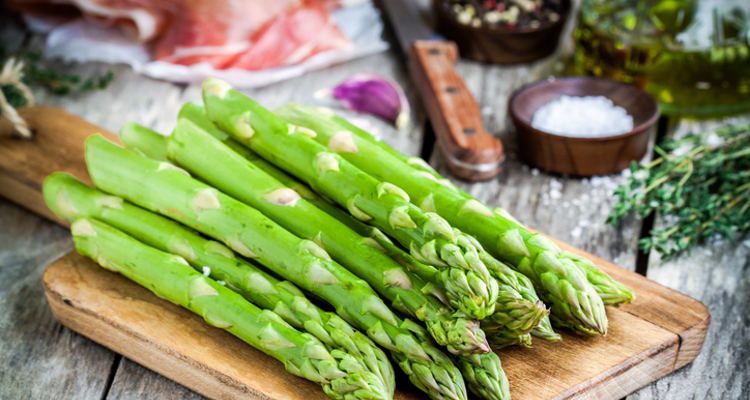
As kids, there are certain vegetables most of us dislike or are afraid of eating. Peas, Brussels sprouts, and asparagus, for example, are all part of the dreaded corner of veggies. Whether you actually didn’t like the taste or it was just the media shaming these poor vegetables, they were often the ones left off the plate entirely or fed to the dog—which is too bad because they have great nutritional value. Asparagus in particular is fairly tasty and it’s incredibly good for you. Asparagus is packed with vitamins and minerals. The facts about asparagus nutrition and the many ways asparagus benefits your health are worth taking a look at. So, don’t toss that asparagus recipe your grandmother sent you into the trash!
Asparagus, known in botanical terms as Asparagus officinalis, is a flowering vegetable plant that has its shoots packed with nutrients. It is widely grown and cultivated in Europe, and some parts of Africa and Asia.
On the other hand, Asparagus racemosus is a short, flowering plant grown in India, Sri Lanka and Nepal; the roots of this plant have been used as a medicine in Ayurveda for gastric issues and reproductive health.
Lactating mothers consume the powdered form of this plant to increase the quantity of breast milk. You need not confuse the two as the latter is not used in any food recipes. Here, we focus on Asparagus officinalis, which is used in a lot of recipes because of its health benefits.
Asparagus (officinalis) Nutrition Facts
| Asparagus, raw, 1 spear (16 g) | |
|---|---|
| Calories | 1 |
| % Daily Value | |
| Carbohydrates 1g | 0% |
| Dietary Fiber | 1% |
| Vitamin A | 2% |
| Vitamin C | 1% |
| Vitamin K | 8% |
| Thiamin | 2% |
| Iron | 2%. T |
| Copper | 2% |
*Source: SELF Nutrition Data
At first glance, the nutritional values of asparagus may seem a little underwhelming. But keep in mind the nutritional table above is for one piece of asparagus. In one piece of asparagus, you get eight percent of your daily requirements of vitamin K.
You will probably use more than one spear when adding asparagus to a recipe or cooking as a side dish, so that’s a fair amount of nutrition you will be gaining. The other good thing to keep in mind is that the nutritional value of asparagus doesn’t change very much when cooked, unlike some other vegetables.
Carbs in asparagus come from the dietary fiber and sugars. It has a good amount of protein and good fats such as omega-3 and omega-6 fatty acids. It has decent quantities of minerals such as iron, copper, manganese, and selenium. Asparagus, when cooked, also provides 1.08 milligrams of zinc.
Numbers are good to see, but what does it all mean? Why is asparagus good for you? What does it actually do for your health? We’re glad you asked.
12 Health Benefits of Asparagus
Why is asparagus good for you? Asparagus is a very nutritious vegetable. Even one piece of asparagus packs a good nutritional punch and has many potential health benefits. Here are the top 12 health benefits linked to asparagus.
1) Bone Health
Eating asparagus regularly may improve the health of our bones. Asparagus is packed with vitamin K, which helps regulate the calcium needed to build bones. Research also indicates that vitamin K may reduce the risk of bone fractures and improve bone density in those with osteoporosis. However, there have been conflicting reports regarding its role in bone density.
2) Diuretic
Asparagus can act as a natural diuretic, which means it helps increase urine production. This increased urine production ensures that excess minerals in the body like sodium are excreted. A drawback is, yes, your pee will smell a little after eating asparagus, but the vegetable may be doing good things for your health.
3) Cardiovascular Health
Asparagus may also be a rather good vegetable for your heart. The vitamin B available in asparagus can help lower homocysteine levels. Homocysteine is a non-protein amino acid that has been linked to blockage of arteries, heart disease, and stroke, although more evidence is needed to support the connection between low homocysteine levels and reduced risk of heart attacks and strokes. The soluble fiber that asparagus provides can help lower your low-density lipoprotein (LDL) cholesterol, which is also good for your heart.
4) Digestive System
The prebiotic carb, inulin, found in asparagus is very good for your digestive tract. Inulin passes the digestive tract and breaks down directly in the large intestine, as it feeds the good bacteria in your intestines. Asparagus also has other dietary fiber, both soluble and insoluble, which also aids in digestion.
5) Skin Health
The antioxidants (vitamins C and B) found in asparagus can be good for your skin as they may help maintain its appearance as well as help repair some damage caused by age and the sun. It should also be noted that asparagus contains a B complex vitamin called niacin, which can reduce and prevent skin blemishes.
6) Anti-Cancer Properties
Asparagus has nutrients that may make it a valuable ally in the prevention of cancer. A lot of the antioxidants carried in asparagus may help prevent cancers of the colon, pancreas, bone, and breast.
7) Brain Health
One of the other reported benefits of asparagus is improved brain health—at least in the long term. Asparagus contains a healthy dose of thiamine, which is essential for brain function. Thiamine deficiency has been linked to certain types of dementia and diseases like Alzheimer’s.
8) Insulin
For those who may be a candidate for type 2 diabetes, asparagus may help improve insulin secretion, a very important step to both the prevention and maintenance of type 2 diabetes. The vitamin B group present in asparagus helps metabolize sugars.
9) Anti-Inflammatory Properties
The antioxidants in asparagus may also help with inflammation throughout the body. This could be a benefit for those who suffer from rheumatoid arthritis.
10) Folate
For women who are pregnant or trying to conceive, asparagus is an excellent provider of folate, which is essential to the development of the fetus.
11) Weight Loss
Asparagus may also help with weight loss. The amount of fiber found in asparagus not only helps with the digestive system but also makes you feel fuller. That may, in turn, lead you to snack or eating less.
12) Kidney Stones
Asparagus may help prevent uric acid kidney stones, though more scientific evidence is needed to support this claim.
But with all that good, there should be some bad, right?
Are There Any Side Effects of Asparagus?
Many fruits and vegetables do have side effects from eating too much of them, and asparagus is no exception. The good thing is that asparagus doesn’t have very many side effects and they can be summed up quite quickly.
- Asparagus can be a natural diuretic, which we pointed out as a benefit earlier. It helps with urine creation. This can be an issue for anyone who is already losing too much liquid from their system or is already taking a prescribed diuretic.
- As much as asparagus may prevent kidney stones, there is also strong evidence that shows it may aggravate kidney stones if you already have them. This is something to keep in mind if you are prone to kidney stones.
- It will make your urine smell a little fouler than usual. That’s due to a compound found in asparagus and how it reacts when digested.
Asparagus: It’s Good for You!
We might have stayed away from asparagus as children. After all, it had a bad reputation and none of the kids on TV liked it. But as adults, it’s clear that the vitamins, minerals, and potential health benefits outweigh any stigma attached to the vegetable from our youth.
Low in carbs and high in fiber, asparagus can help you out from your heart to your digestive system and may even help prevent cancer. And it doesn’t taste bad, either. One look around the Internet and you will find tons of healthy asparagus recipes that also taste good. With all of these things combined, maybe it’s time to add asparagus back into your diet.
Related:
- Sulfur-Rich Foods: Health Benefits of Eating High Sulfur Foods
- Strawberry Nutrition Facts and Health Benefits
- Health Benefits of Drinking Epsom Salt
- What Are Slow Digesting Carbs? What Are their Health Benefits?
Sources:
“Asparagus, raw, nutrition facts and calories,” Self Nutrition Data; http://nutritiondata.self.com/facts/vegetables-and-vegetable-products/2311/2, last accessed February 17, 2017.
Forberg, C., “5 Powerful Health Benefits of Asparagus You Probably Didn’t Know,” Eating Well, March 23, 2016; http://www.eatingwell.com/blogs/health_blog/5_powerful_health_benefits_of_asparagus_you_probably_didn_t_know, last accessed February 17, 2017.
Nichols, H., “31 Science-Backed Health Benefits of Asparagus,” Well-Being Secrets; http://www.well-beingsecrets.com/health-benefits-of-asparagus/, last accessed February 17, 2017.
Ghosh, M., “7 Nutritional Benefits Of Asparagus In Pregnancy,” Mom Junction, July 21, 2015; http://www.momjunction.com/articles/nutritional-benefits-asparagus-pregnancy_0085922/#gref, last accessed February 17, 2017.
















